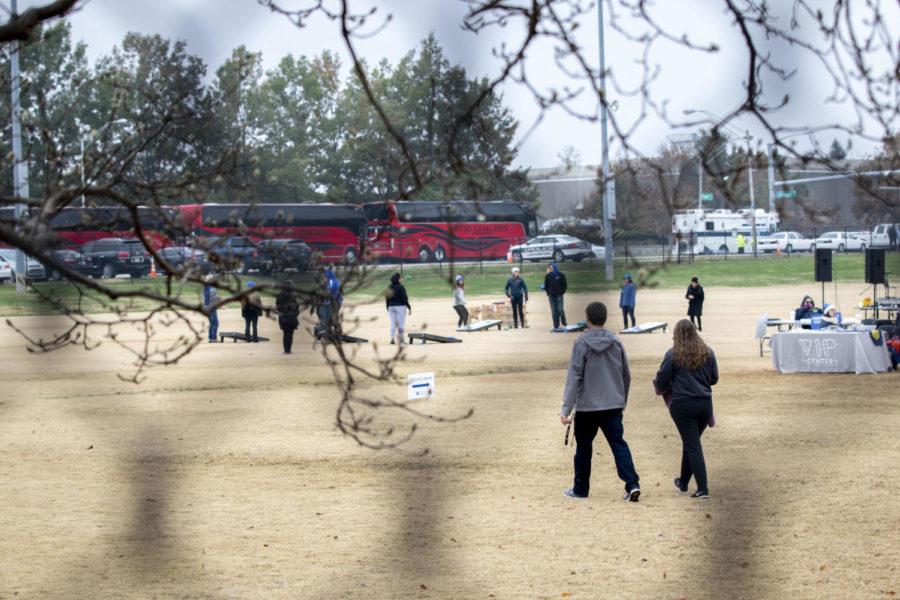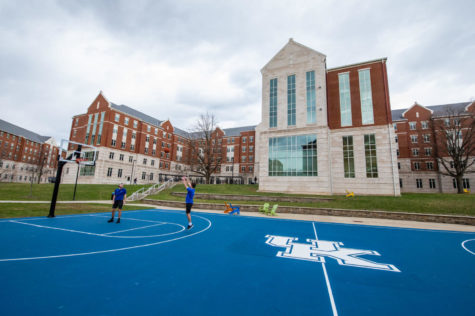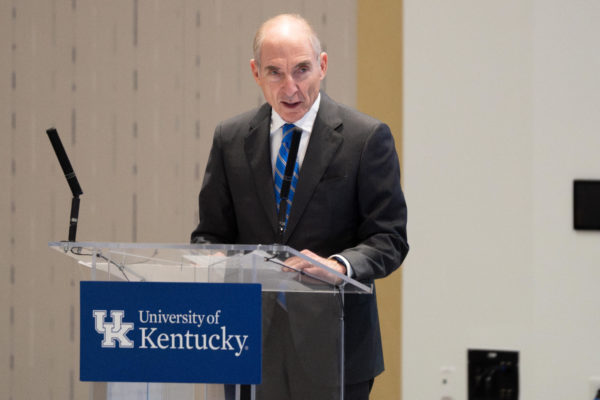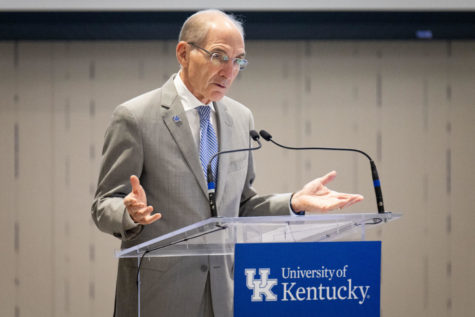Looking for tailgate culture change, UK seeks more feedback
November 27, 2018
This fall football season has brought UK students and administrators perhaps the most eventful tailgate season in recent memory.
With the introduction of an all-student, university-controlled tailgate zone where alcohol is limited, university officials signaled that they were looking to continue to combat a college drinking culture that is pervasive both nationally and locally. At the same time, the wilder side of tailgate culture has bitten back with a car-flipping incident that went viral, a fraternity banned and a UK student arrested after a tragic car accident during an early season home football game that left a 4-year-old boy dead.
Seven tailgates later, has the university’s experiment gained any ground?
Why have an all student tailgate anyway?
The Gameday Zone, a fenced-in tailgating zone specifically for UK students, was introduced this fall to hep UK try to change student tailgate culture and better enforce its alcohol policy by pushing on-campus student tailgating into an enclosed and more easily monitored setting. The university-mandated tailgate is a far cry from The Bowl, UK’s historically wild tailgate zone next to the Blue Courts on Cooper Drive, where there were no tailgates allowed this year.
For some students, UK’s switch to the Zone was viewed as a war on fun, but, according to Dean of Students Nick Kehrwald, the university’s switch to the zone is largely predicated on a desire to increase general student wellness by combating a college drinking culture, which encourages excessive and potentially dangerous alcohol use, he said.
“For the population that I interact with, the students on this campus, alcohol has and remains the number one issue from a substance use perspective,” Kehrwald told the Kernel in November. He added that excessive alcohol consumption can have a measured effect on many aspects of student life, including physical health, academic performance, friendships, physical violence and sexual violence.
“Every dean of students in the country will still tell you it’s the number one substance that we think about. That hasn’t changed, but it’s complicated. There’s not one simple solution to it,” he said.
Several media organizations and on-campus student leaders had said they’d hoped that the shocking death of a 4-year-old boy, who was struck by a sedan driven by a UK student who was allegedly under the influence of alcohol, would hopefully kickstart a campus culture change.
The means by which that change might have been measured are unclear, but what is clear is that UK’s Gameday Zone has remained relatively unpopular among some student groups. University officials have reiterated that they are trying to learn as much as possible about the first semester of the tailgate zone and are looking at implementing changes relating to student feedback.
How has the tailgate gone?
Kehrwald said overall attendance in the space has fluctuated throughout the season. One of the most well-attended games was the homecoming game in October against Vanderbilt, a windy, overcast affair that saw more than 400 students visit the space. Student organization participation has been low, he added.
The university has hosted student focus groups and has assigned classes that patrol the zone asking for student feedback and measuring attendance.
Kehrwald said that getting a wide range of opinions from students who have actually gone to the space has been challenging because “the students who use it are typically going to give positive, affirmative responses, right? Because that’s why they’re showing up.”
Allison Olmsted, a post-graduate pharmacy student who was at the Gameday Zone in September, said the tailgate scene she saw outside the Johnson Center was radically different than when she was an undergrad.
“We were around when the Bowl was a bigger thing and we were both in sororities in undergrad so we kind of got to see that side of everything. Now that we’re older we were wanting something a little more tame I guess,” Olmstead said with a laugh.
Angela Wuerger, a pharmacy student who was at the space with Olmstead, said UK “gave us a place to go as a community.”
“I want students to have fun, but I want it to be safe,” Wuerger said. “Clearly nobody wants what happened to happen again. It’s kind of a give and take.”
UK has tried to take in feedback from those who don’t go, and has looked at trying to implement some of the changes that they’ve suggested.
“Music has been a real critical point,” Kehrwald said.
This year the space has primarily featured DJs and for next year, they’re looking at the viability of live music acts. But some other suggestions are an absolute no-go.
“Obviously some of the feedback we’ve heard is, ‘Don’t restrict the amount of alcohol,’” Kehrwald said.
He said that doing so would violate the university’s policies and suggested that might make it easier for underage and irresponsible drinking to find its way into the space.
For the first four tailgates, the university allowed students, 21 and older, to bring a limited amount of alcohol into the space— each person could bring one six pack of beer or equivalent in wine coolers. But midway through the season the university switched to having beer and cider sold through a third-party vendor for $3.50 per drink. Student-brought alcohol was banned.
Kehrwald said the switch from a “Bring your own beer” policy to bringing in a local brewery to serve of-age students was mainly a way for the university to simplify the process and alleviate a logistical headache for UK and the organizations who attend and are trying to ensure that its members are abiding by the rules.
“The feedback from students said, ‘Hey, if you have a third-party vendor where you could purchase alcohol it means you still allow alcohol into the space but it just eliminates a whole host of policy and procedures…” Kehrwald said. “It’s real easy, if you’re 21, you show up, a vendor checks your ID and you don’t have to worry about a whole host of other steps.”
But what about off-campus?
In 2016, UK amended its Student Code of Conduct so that the code was enforceable off-campus. That involved working with city government to insure that UK can stay on top of violations within city limits. Kehrwald said that the code is enforceable worldwide so long as the university knows about it.
“Typically we’re going to get things in the Lexington area and the surrounding neighborhoods,” Kehrwald said. “But you might have students who are studying abroad with educational programs connected to the institution and there is, on occasion, the report from a business or establishment where they say, ‘I think I have a group of UK students on spring break and I want to report this back to the university.’”
UK evaluates those reports, decides if it wants to take action then handles and disciplines the students involved in the same way that they might have had the event occurred on campus.
In October, the Lexington city council announced at a meeting that the city had requested a report on how UK has been able to enforce the code. Third district city councilman Jake Gibbs told the Kernel at the time that the city government wanted an update on how the enforcement had progressed, combined with an update on the university’s alcohol policies.
Kehrwald said he anticipates the report will go before the city council in February, and that UK will be “evaluating primarily the fall,” and comparing this past fall to the fall of 2017 and 2016.
“We’ll just see if we have more stuff, less stuff, those kinds of trends, year over year,” Kehrwald said.



















































































































































